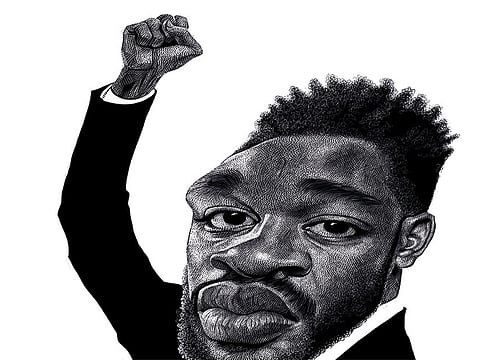Ryan Coogler: Third time’s a charm
The director of Black Panther is causing a stir in Hollywood. He’s young, talented, exciting — and black

I am of an age where I remember Black Panther supporters causing mayhem at the Mexico City Olympics in 1968. As they stood on medal podiums, they gave the clenched-fist salute of their group.
And I remember the grainy colour news footage of the activists, invariably in Vietnam-era green combat fatigue jackets, with big sunglasses and frizzy Afro dos pronouncing about black action, injustice against blacks, the race war.
That is all five decades ago now. But there is still racial inequality in America, many more blacks behind bars, many more stopped or shot by the police, and many struggling with economic and social inequalities.
Then along comes Ryan Coogler.
He is the director behind Black Panther, a movie that is as far removed from those activists, Afros and protests as you can get.
Or maybe not.
Yes, it is a comic book adventure on the premise of superheroes from a space civilisation far advanced than ours who end up on Earth. What a strange place with such primitive views, they wonder?
Yes. Such primitive views. Race. Ethnicity.
Coogler was feeling overwhelmed making Black Panther. It was only his third feature film and, at just 30-years-old, he was making it with Hollywood’s most powerful studio under enormous cultural expectations and with $200 million (Dh735.6 million) to get it right.
And he really didn’t want it to “suck” — his word.
The Oakland, California, native got into filmmaking almost on a lark when a creative writing professor at St Mary’s College in Moraga, California, where he was attending a football scholarship, suggested he look into screenwriting. He had thought he would play football and be a doctor, maybe, to help his community. But this idea of being a filmmaker took hold, and after making a splash at the USC School of Cinematic Arts, he had solidified himself as one of the most promising and vibrant young directors to watch.
His first feature, the indie Fruitvale Station, about the final 24 hours of Oscar Grant III, put him on the map after winning the Sundance Grand Jury and Audience prizes in 2013, a handful of critics groups awards and a Film Independent Spirit Award. His second, the Rocky spin-off Creed, put him on another level.
The $35 million film grossed more than $173 million worldwide and reinvigorated a franchise for Warner Bros.
Black Panther was going to be a huge leap, even if odds that it would “suck” were slim. Coogler, 31, was used to making personal films at his own speed. This was a different beast — with visual effects, a huge ensemble cast and set pieces that would make any veteran filmmaker wake up in a cold sweat.
“This is the first project that I ever did that I felt like I had to make peace with the fact that I would never be caught up in my work,” Coogler said. “I had to figure out how to let myself to rest. You could work 24 hours a day and it still wouldn’t be enough on a film like this. There’s so much happening and so many decisions to be made.”
“I had to learn to be more efficient,” he added. “I got to learn how to do in 30 minutes what it took me two hours to do on the last movie.”
He’s unapologetically who he is, 24x7. And he’s consistent. A lot of people can’t say that about themselves. “We’re still blasting music in between set-ups and takes and everybody on the crew was feeling like a big family. It was awesome.”
Coogler ultimately began to trust that the Marvel Studios executives actually did want him to make his own decisions and then deliver the film he always wanted to. Now he just hopes what he’s made isn’t going to fade.
“The fear I have is that you make something that’s like dispensable, disposable, something somebody watches and forgets. I like movies that you can go back to. Movies that feel like they were always around, as soon as you see it, it feels like it was always there,” Coogler said. “The worst thing in the world is to make this movie and be like, ‘Oh that was OK and on to the next’. Especially not for this one. It’s like you’ve got one shot, you’ve got to get this right.”
By all accounts, the critics think he’s got it right — and there are murmurs that he’s the next big thing when it comes to Hollywood, moguls and the moviemaking business.
And that he’s black?
Hollywood gave up on black and white decades ago. It is a technicolour world where anything is possible. Too bad it’s make-believe.
But maybe, just maybe, that’s beginning to change.
— With inputs from agencies



